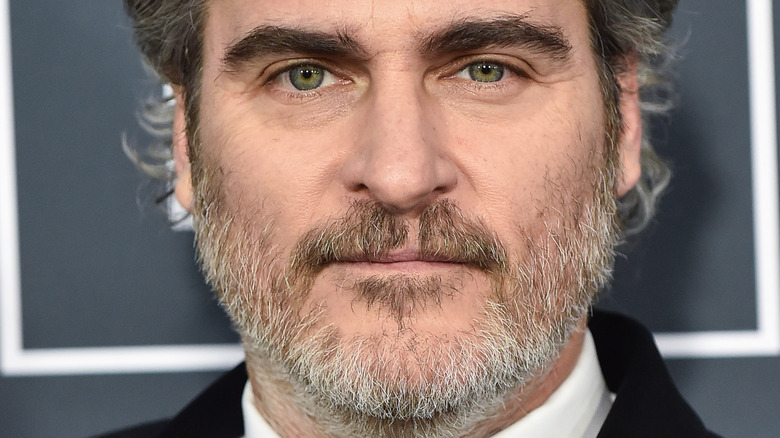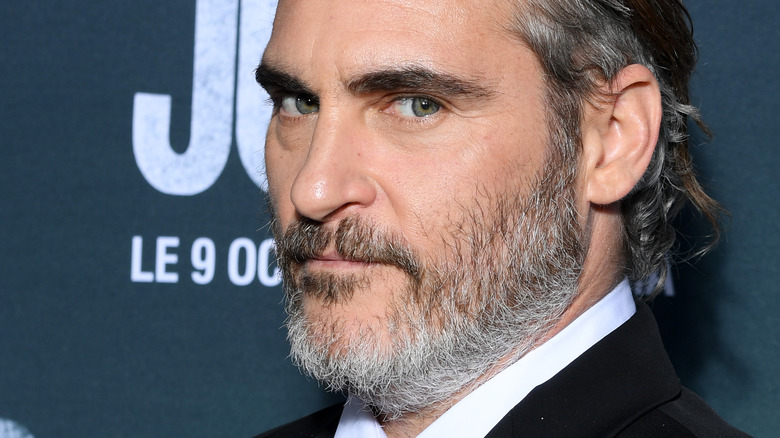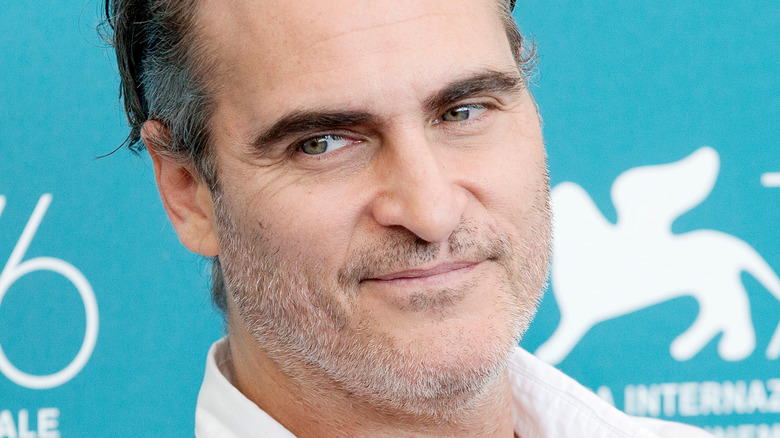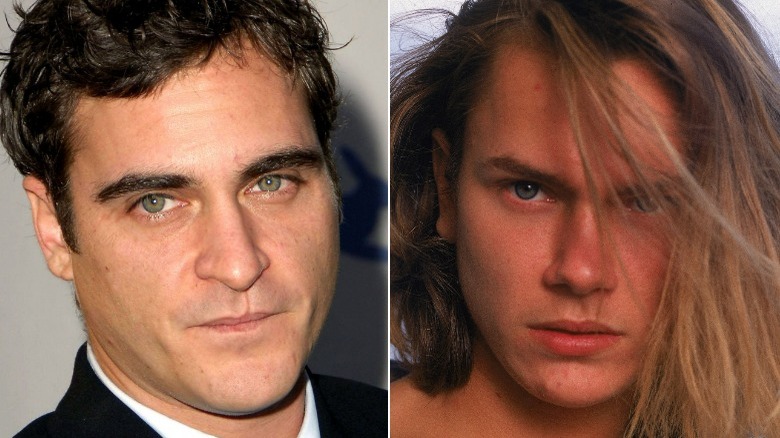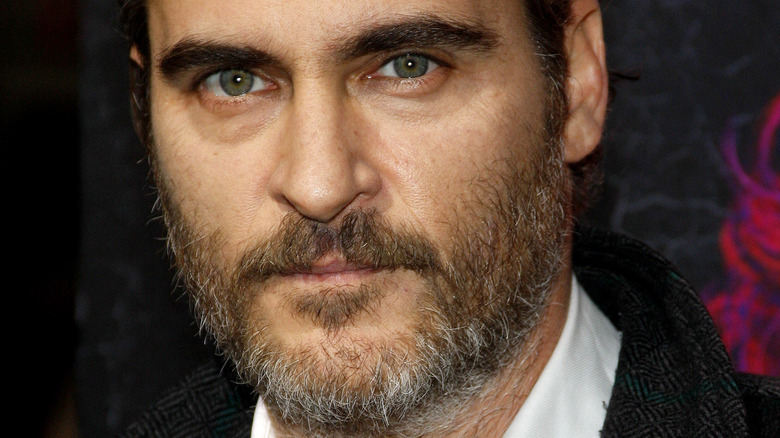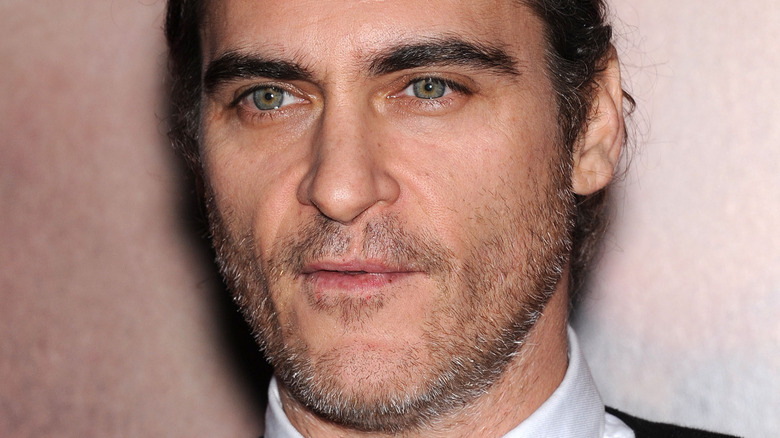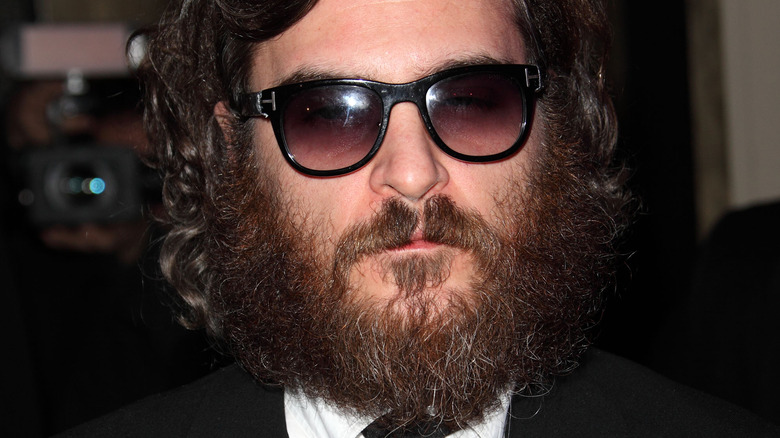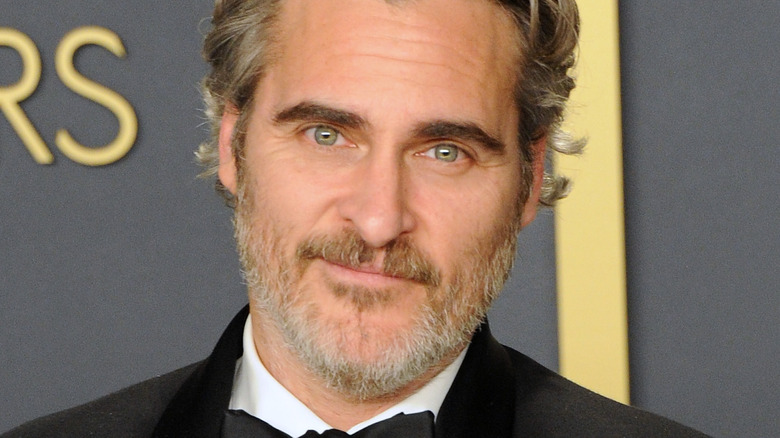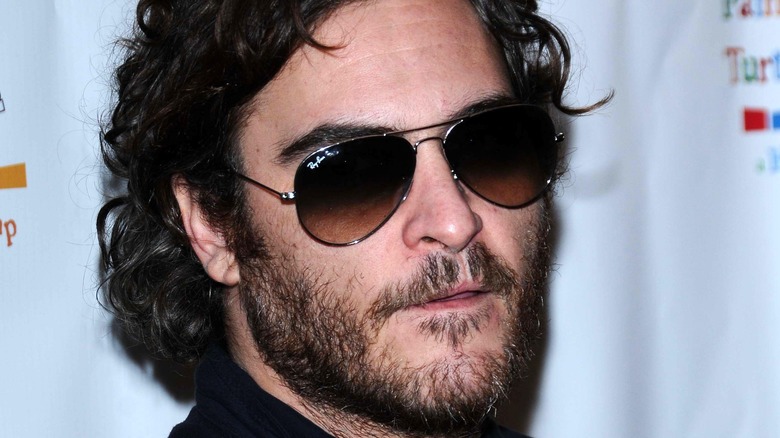The Dark Side Of Joaquin Phoenix
This article contains references to drug and alcohol misuse.
Actor Joaquin Phoenix has long been recognized as having incredible versatility in his acting roles, ranging from his Oscar-nominated depiction of music legend Johnny Cash in "Walk the Line" to his Oscar-winning performance as nihilistic villain Arthur Fleck, in "Joker." Despite having a prolific career on screen that spans over 30 years, the star maintains a very private personal life, in part due to his anxiety about being in the spotlight.
Phoenix grew up in an artistic family, with many siblings who have also enjoyed careers either on screen or in the music field. The actor then rose to fame in the early 2000s after starring in films like "Gladiator," "Signs," and "Buffalo Soldiers."
Throughout his rise to stardom, Phoenix experienced a handful of tragic events, some of which can be attributed to the downsides of working in Tinseltown. From losing his beloved brother to struggling with addiction, this is the dark side of Joaquin Phoenix.
Phoenix grew up in a cult
Joaquin Phoenix was born on October 28, 1974, in San Juan, Puerto Rico. Prior to his career on screen, he grew up with his parents and siblings in the Children of God cult in the 1970s. According to The Mirror, his parents, John and Arlyn Bottom, were already members of the Children of God when he was born, which led them to travel around as missionaries before settling in Caracas, Venezuela. As a child, Phoenix often spent time with other children in the cult or sang songs in the street in exchange for food, per Daily News.
Children of God itself was based around Christianity but took its own liberties in establishing new rules and belief systems. As reported by Esquire, the organization's leader, David Brandt Berg, implemented a new recruiting system called "flirty fishing" in which women members would have sex with outsiders as a means to entice them to join the cult. It was around this time that Phoenix's parents received a letter detailing the new practice, which turned them off and motivated them to flee.
Reflecting on his parent's initial decision to join the cult, the "Joker" actor told Vanity Fair, "I think they were idealists, and believed that they were with a group who shared their beliefs, and their values. I think they probably were looking for safety and family. Leaving a country that had assassinated a president and any number of civil rights leaders within a few ... years, which is so hard for me to fathom, right?" After leaving Venezuela, the family moved to Florida and once again to Los Angeles, where Phoenix's career would start to take off.
A traumatic moment made Phoenix vegan for life
Joaquin Phoenix's early years were filled with many life-changing moments, including one that inspired him to become vegan at the young age of three. As Phoenix's family were leaving the Children of God cult, they boarded a cargo ship with Miami as its destination, according to Vanity Fair. In October of 1977, on Phoenix's third birthday, the family were bound for the Florida city when the "Walk the Line" actor was delighted to watch fish jumping out of the water. When they were caught by some fisherman, the toddler watched as the animals were smashed into nails on the side of their boat.
Phoenix was immediately distraught, later recalling to The Times, "It was such a shocking, visceral experience ... As a child, your parents just say, 'It's fish' and you don't know the difference between fish or broccoli. And to suddenly realize that this thing that we've eaten once used to be full of life and we can see it struggling for its life." From that moment on, the family stopped eating meat and fish, then later committed to the vegan lifestyle.
Since the harrowing childhood experience, Phoenix has dedicated his time to many causes that champion animal rights. He has worked closely with PETA over the years, and even attended a vigil at a pig slaughterhouse directly following his acceptance of the SAG Award in 2020, per People.
He witnessed his brother die
Growing up, Joaquin Phoenix was incredibly close with his siblings, but especially his older brother. River Phoenix was four years older, and throughout the 1980s and early 1990s he'd already proved himself as a prominent actor, earning an Oscar nomination for his role in the 1988 film, "Running on Empty."
As River continued to rise in the Hollywood scene, he often hung out with musicians like Flea and John Frusciante of The Red Hot Chili Peppers or frequented clubs attended by other rising actors such as Johnny Depp. Along with his older brother, Joaquin partied at The Viper Room, a club partially owned by Depp in Hollywood, per Vanity Fair. On October 30, 1993, River went to The Viper Room with Joaquin, their sister Rain, and his girlfriend Samantha Mathis. While at the club, River took a cocktail of heroin and cocaine, which led him to collapse on the sidewalk and subsequently have seizures, as reported by The Guardian. After being brought outside by Mathis, a frantic Joaquin dialed 911, but his brother was already dead by the time EMTs arrived.
For decades to come, the actor continued to honor his late brother. "I feel like in virtually every movie that I made, there was a connection to River in some way," Joaquin told "60 Minutes" (via CBS News) in 2020. "And I think that we've all felt his presence and guidance in our lives in numerous ways," he added about himself and his family.
If you or anyone you know is struggling with addiction issues, help is available. Visit the Substance Abuse and Mental Health Services Administration website or contact SAMHSA's National Helpline at 1-800-662-HELP (4357).
Phoenix struggled with alcohol misuse
As Joaquin Phoenix continued to rise to stardom throughout the 1990s and 2000s, fame started to get to him. By the mid-2000s, the actor was being hailed as one of the greatest in modern times, with his performance as country music legend Johnny Cash in "Walk the Line" earning him critical acclaim and award nominations. It was at this time that Phoenix started to develop a problem with misusing alcohol, which then influenced other reckless habits in his life.
His performance in the musical biopic allegedly drove him to become more dependent on alcohol, as Cash himself struggled with issues relating to drug and alcohol misuse. Phoenix explained to Time Out (via The Irish Examiner), "It was then that I became aware of my drinking. I wasn't an everyday drinker but didn't have anything else to do, anything to hold me down. I was leaning on alcohol to make me feel ok. That's what it really was."
Despite experiencing a time of great professional success, Phoenix suffered privately and went through a difficult patch in his personal life. Reflecting on this time, the "Signs" actor told GQ, "I wasn't engaging with the world or myself in the way I wanted to. I was being an idiot, running around, drinking, trying to screw people, going to stupid clubs." In April 2005, he checked himself into rehab to help control his problem. Speaking to The New York Times that same year, he divulged that he'd joined Alcoholics Anonymous and stated, "This is the best thing I ever did."
If you or anyone you know is struggling with addiction issues, help is available. Visit the Substance Abuse and Mental Health Services Administration website or contact SAMHSA's National Helpline at 1-800-662-HELP (4357).
A famous director rescued him from a car accident
As Joaquin Phoenix was still reveling in the success of "Walk the Line," the actor was privately overcoming a problem with alcohol misuse. But nothing could prepare him for an accident that would occur on January 26, 2006. According to CBS News, Phoenix was driving when his brakes spontaneously failed, causing him to lose control of his car and crash it into another.
At the time of the crash, the "Gladiator" actor had flipped his vehicle and was completely disoriented, though thankfully unscathed. As he attempted to exit his car, prolific director Werner Herzog, perhaps best known for his documentary films like "My Best Fiend" and "Grizzly Man," approached Phoenix and helped calm him in the moment. "There was this German voice saying, 'Just relax' ... There's something so calming and beautiful about Werner Herzog's voice. I felt completely fine and safe," Phoenix explained, per The Guardian. He added that Herzog didn't stick around long. "I got out of the car and I said thank you. And he was gone."
Thankfully, both the actor and the individual he hit were unharmed in the accident. Rather, the two exchanged information and went about their day.
He has given some weird TV interviews
Joaquin Phoenix is notoriously private and rarely gives sit-down interviews, but when he does, they are a bit unconventional. His apprehension toward interviews is partially shaped by a handful of bad ones he had growing up. In an interview with IndieWire, the "Joker" actor revealed, "When I was a kid — and even as an adult — some of the questions I was asked in interviews really shocked me. I don't know how you can be in that position of power and abuse it in that way."
Knowing the backstory behind Phoenix's attitude with interviews makes his unconventional TV appearances more understandable, though not any less awkward. In February 2009, the actor made an unusual appearance on "The Late Show With David Letterman," in which he flaunted a thick beard, long hair, and sunglasses. Throughout the interview, Phoenix was reserved and mysterious, which led many to believe that it was real. Turns out, it was all a bit and his persona was just a character for a mockumentary called, "I'm Still Here," per The Guardian.
By 2019, that particular role was long behind him, but the actor may have still been doing pranks in TV interviews. During an appearance on "Jimmy Kimmel Live" to promote "Joker," the host shared a clip of Phoenix having an intense moment on set. The remainder of the interview was awkward and the actor appeared embarrassed. However, his publicist later told EW that it was simply a joke outtake.
His controversial Oscar moments
Despite being an Oscar-winning actor, Joaquin Phoenix has had his fair share of controversial moments regarding the ceremony. In 2012, the actor was nominated in the Best Actor category for his role as Freddie Quell in Paul Thomas Anderson's "The Master." Prior to his nomination, however, Phoenix expressed to Elvis Mitchell of Interview Magazine his true feelings about Hollywood's biggest night. "I'm just saying that I think it's total, utter bulls***, and I don't want to be a part of it. I don't believe in it ... It's totally subjective. Pitting people against each other ... It's the stupidest thing in the whole world," he said during the interview. At the time, the media immediately held polarizing opinions about his statements and even speculated that he hurt his chances of winning. Ultimately, Phoenix lost to Daniel Day-Lewis that year.
Eight years after his nomination, Phoenix took home the Oscar for his performance as Arthur Fleck in "Joker." During his acceptance speech, the "Her" actor unexpectedly took the moment to advocate for animal rights. "We feel entitled to artificially inseminate a cow, and when she gives birth, we steal her baby. Even though her cries of anguish are unmistakable. And then we take her milk that's intended for her calf and we put it in our coffee and our cereal," he expressed. While the audience applauded his statements, following the ceremony, his speech drew as much praise as it did criticism.
Filming movies are intense for him
Despite being one of the most esteemed actors of his generation, Joaquin Phoenix experiences anxiety while he films movies, which can lead to some intense moments on set. The actor opened up about his acting experiences to Interview Magazine, saying, "I've been acting for 30 years. But I still get nauseous the day before and have weeks of incredible anxiety. They have to put ... pads in my armpits because I sweat so much that it just drips down my wardrobe. For the first three weeks of shooting, I'm just sweating."
Phoenix's anxiety managed to interfere with his early days of rehearsal for "Joker," with the actor clashing with fellow actor Robert De Niro due to differences in how they approach work. According to a cover story with Vanity Fair, De Niro wanted to do a read-through of the entire script, and Phoenix declined to do so due to his anxiety. The "Signs" actor eventually did a read-through, though it was not without struggle. Eventually, Phoenix and De Niro met one-on-one together to squash their brief misunderstanding, with the "Raging Bull" actor telling Phoenix, "It's going to be okay, bubbeleh," accompanied by a kiss on the cheek.
When filming a movie concludes, Phoenix is just as anxious, as he pours his entire soul into a character. He previously told The Guardian in 2006, "The job finishes and you say, 'What do I do? How do I act? What is my life?' It can be very lonely."

